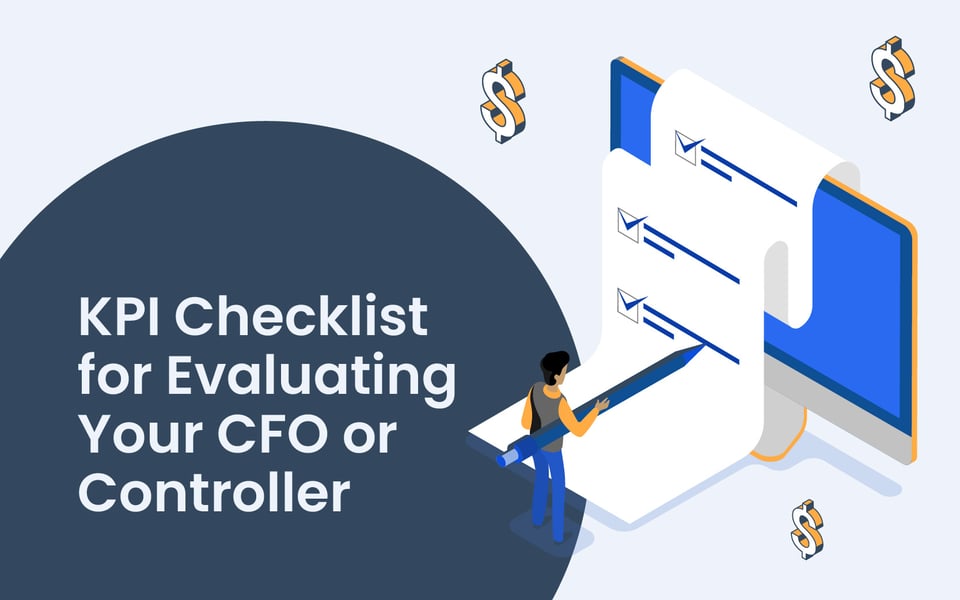What is the difference between a CFO and a controller?
CFO, controller ... potato, po-tah-to.
If only it were that simple. While the two could, in theory, fill each other’s shoes and tackle the same tasks, they’re actually distinct roles that fulfill individual responsibilities.
Controller Responsibilities
Controllers are basically lead accountants that know the ins and outs of your accounting system and keep everything running smoothly. In that vein, they take on specific duties, such as:
Seeing strategic goals through to completion
As accounting leads, controllers keep a pulse on the department, overseeing both bookkeepers and accountants. They help you stay accountable to your financial goals, building out processes for accounting, bookkeeping, and reporting and carrying out tactics to strengthen the company’s accounting procedures.
Tracking your budget
How much should you spend and where? Controllers prepare budgets based on historical insights and offer advice to improve business performance. This also includes monitoring payment receipts from customers and debtors to ensure money is going where it needs to and overseeing financial reporting to inform management decisions, including budget variances, income statements, profit-loss statements, and balance sheets.
Ensuring you’re hitting your budget and margins
Controllers are tactical, so they’re always looking for ways to help you improve. A big part of this involves monitoring expenses so your business can increase profit margins and implement cost savings.
CFO Responsibilities
CFOs and virtual CFO services are strategy partners that look after the big picture for your business just like you do. They want to see you grow, and they tackle responsibilities that help you get there, including:
Forecasting and managing cash flow
Need a compass for how to get from Point A to Point B? Forecasting helps your team understand what could happen in the future based on the decisions you make today. CFOs analyze past data and current trends to make predictions about future business performance.
Managing debt
Escape the debt monkey. If your company has debt, your virtual CFO services partner can create a reduction plan. And just because you have debt doesn’t mean you shouldn’t be able to secure new lines of credit. A CFO can help here and ensure your compliance with debt terms.
Introducing processes
Get your finances moving like a well-oiled machine. CFOs and virtual CFO services get you up to speed on processes to streamline your accounting. One example might be introducing optimized work processes to improve cost reduction.
How do you track their performance?
You probably look at certain KPIs—from total sales and revenue to customer retention and acquisition—to standardize evaluations and accurately measure performance. But that’s just one angle to approach performance from. You can use KPIs to gauge the health of your business at a glance and grow your business, but you can also use them to assess your financial team.
KPIs to Measure CFO and Controller Performance
So how do you assess controllers and virtual CFO services? The short answer: They’re as effective as the value they deliver to your company. But more specifically, you might consider looking at a few metrics, such as:
Working capital
How well is your working capital being managed? This is the money your business uses every day for its operations, and your available funds can put you in a good place or in dire straits. Working capital is measured as either positive or negative, indicating whether your business can or cannot fund its daily operations. It’s an important KPI for controller and CFO services because if you’re in the minus column, that indicates a lack of efficiency and/or a need to raise more capital.
Return on equity (ROE)
There’s more than one way to look at your financial performance. ROE illustrates a return on net assets, gauging your profitability and efficiency in generating profits. Your business can be on the high side or low side, but the higher your ROE, the more efficient your virtual CFO services are at helping you bring in income and growth from equity financing.
Accounts receivable turnover
Every customer has to pay the piper, and you’re pretty happy when that’s you! Accounts receivable turnover helps you see how effective the business is at collecting receivables. You want a higher ratio here because it indicates higher efficiency. Without that, your CFO and controller have missed a few beats, and the accumulating A/R will create cash challenges.
Accounts payable turnover
You know your business is just as responsible for making timely payments to keep the operation running as customers are for paying you. That’s why accounts payable turnover acts as a convenient ratio of how many times you pay off your vendors. You can use it to show how well you’re doing at paying off debts. The higher your A/P turnover, the more efficient your accounting team is at submitting quick payments.
Average days delinquent
Are customers taking their time paying your business? Also known as days sales outstanding, your average days delinquent (ADD) identifies how quickly your company collects on invoices. An essential cash flow KPI that evaluates the effectiveness of collection efforts, continually high ADD scores across numerous clients can indicate inefficiencies.
Why is tracking performance important?
Did you know? A 2022 study noted CFOs will play the most crucial role in organizations over the next several years. Poor performance as a CFO or controller is tied heavily to the potential success of a business—more so than most other positions because of their role in the financial health of the organization.
Benefits of Tracking Performance
Consider this: The quality of your marketing team might impact how creative your marketing campaigns are, but it won’t make or break the business. Your controller and CFO services, on the other hand, are in a different boat. By holding these partners accountable, you get:
Early intervention
Financial issues can be devastating, and if your CFO or controller could have prevented them, that's all the worse. But tracking performance helps you be proactive with your team, allowing you to course correct. This way, you can spot problems before they arise—or at least before they cause long-term damage.
Consistent improvement
Completing routine performance evaluations uncover areas for improvement and identifies specific inefficiencies, from managing the accounting team to spending wisely. On top of this, knowing that performance is being monitored enforces accountability.
Improve your bottom line with Ignite Spot!
CFOs and controllers each have their own wheelhouse and work to support your financial success in unique ways. But that doesn’t mean you have to hold them to completely different standards. In fact, you can measure their performance with a basic set of KPIs, from working capital to ROE. And if you want to continue to grow and succeed, the right partners are clutch.
So, who do you need by your side right now? Ignite Spot is your go-to for controller and virtual CFO services. Explore our solutions and get in touch to elevate your business.












.png)




